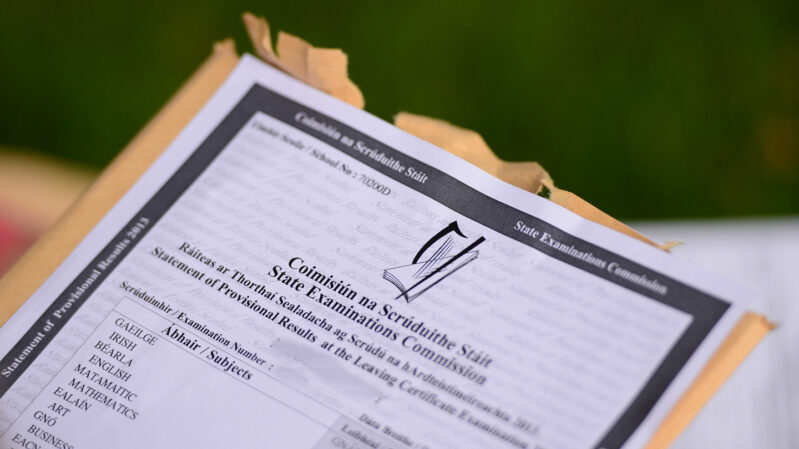Written examinations will be worth no more than 60 per cent of a student’s final leaving certificate marks, as part of major reform plans being announced by Minister for Education Norma Foley this afternoon.
Proposed reforms could make considerable changes to the leaving certificate as it currently functions from 2024, including more project work and and the spreading out of exams over fifth and sixth year.
Classroom-based assessment is also being considered.
The aim is that eventually, 60 per cent of marks for all leaving certificate subjects will be based on written exams and 40 per cent on assessment components such as project work, orals or practicals. If implemented, the changes will “reduce pressure while maintaining standards” and “achieve equity and excellence for all”, Foley said.
The reforms also look to create two new leaving certificate subjects: drama, film and theatre studies and climate action and sustainable development, to “meet the needs and expectations of our students and of our society in preparing our young people for the world ahead”.
Higher Education Minister Simon Harris has welcomed the proposals. He wrote on Twitter that they have “the ability to transform education and move us beyond a reliance solely on rigid written exams”.
Today’s publication of senior cycle reform plan is welcome.
This has the ability to transform education & move us beyond a reliance solely on rigid written exams.
This ties in with my work to ensure as many pathways & opportunities as possible post-school.
— Simon Harris TD (@SimonHarrisTD) March 29, 2022
The proposals will be piloted in several network schools in September 2024. These pilot schools will also have access to updated subject curricula in chemistry, physics, biology and business, as well as updated forms of assessment in those subjects.
If implemented, students entering fifth year in September 2023 would sit Paper One of English and Paper One of Irish at the end of fifth year.
Teacher-based assessment of some components would be externally moderated by the State Examinations Commission. A new Senior Cycle Programme Delivery Board would be established which would have responsibility for overseeing the roll-out of the reforms. A detailed implementation plan would be developed through consultation with education partners, including teachers, students, school leaders and parents.
The possibility of the changes happening hinges on teacher support, whose responsibilities would be increased by their assessment of coursework over the course of two years. Union opposition to Junior Cycle reforms in the past led to planned reforms being delayed and watered down in the face of industrial action.
The announcement follows a four-year review of the senior cycle by the National Council for Curriculum and Assessment (NCCA), based on consultations with students, teachers, parents and industry.
The review found that while there was broad agreement that exams should remain, it proposed giving greater weight to continual assessment, projects or other course components over a two- or three-year period.
Foley said: “This is an ambitious programme of reform. It will enrich students’ educational experience by increasing their choices to match their interests and enhancing teaching and learning.’
“It will reduce the pressure on students that comes from final assessments based primarily on examinations. We will move to a model that uses other forms of assessment, over a less concentrated time period, in line with international best practice.”
She said: “Our current system has many strengths. But we know that it can be improved, to better support our students, to reduce pressure while maintaining standards, to keep pace with the changes in practices internationally and to meet the needs and expectations of our students and of our society in preparing our young people for the world ahead.”
Some concrete changes to the leaving certificate were announced today as well. Future oral exams and the music practical performance will take place during the first week of the Easter break of sixth year. Leaving certificate applied (LCA) students will have improved access to maths and foreign languages from September 2022. A new qualification will be introduced at level one and two on the National Qualification framework to provide an appropriate level of assessment to some students with special educational needs, building on the equivalent programme at junior cycle level.







